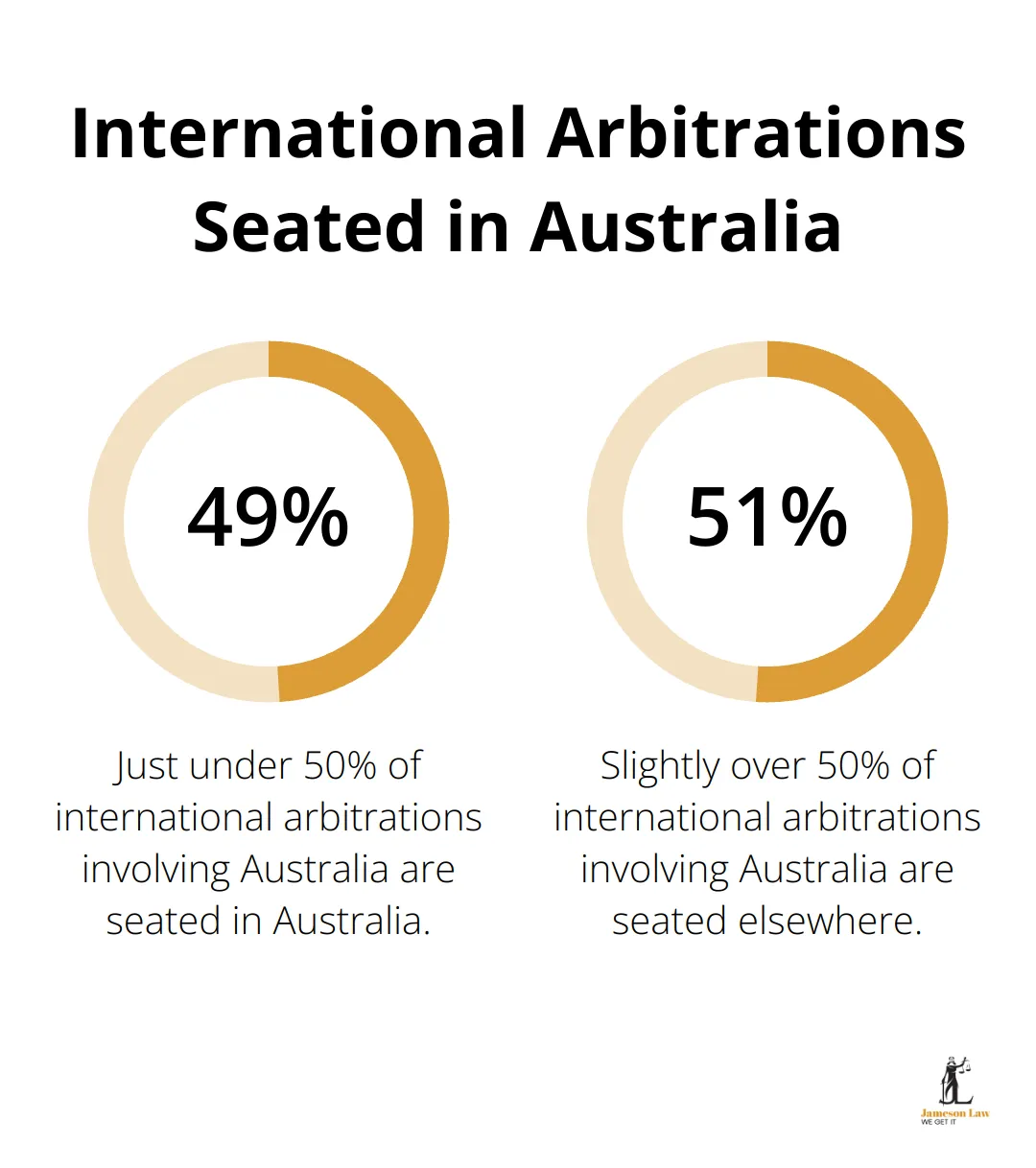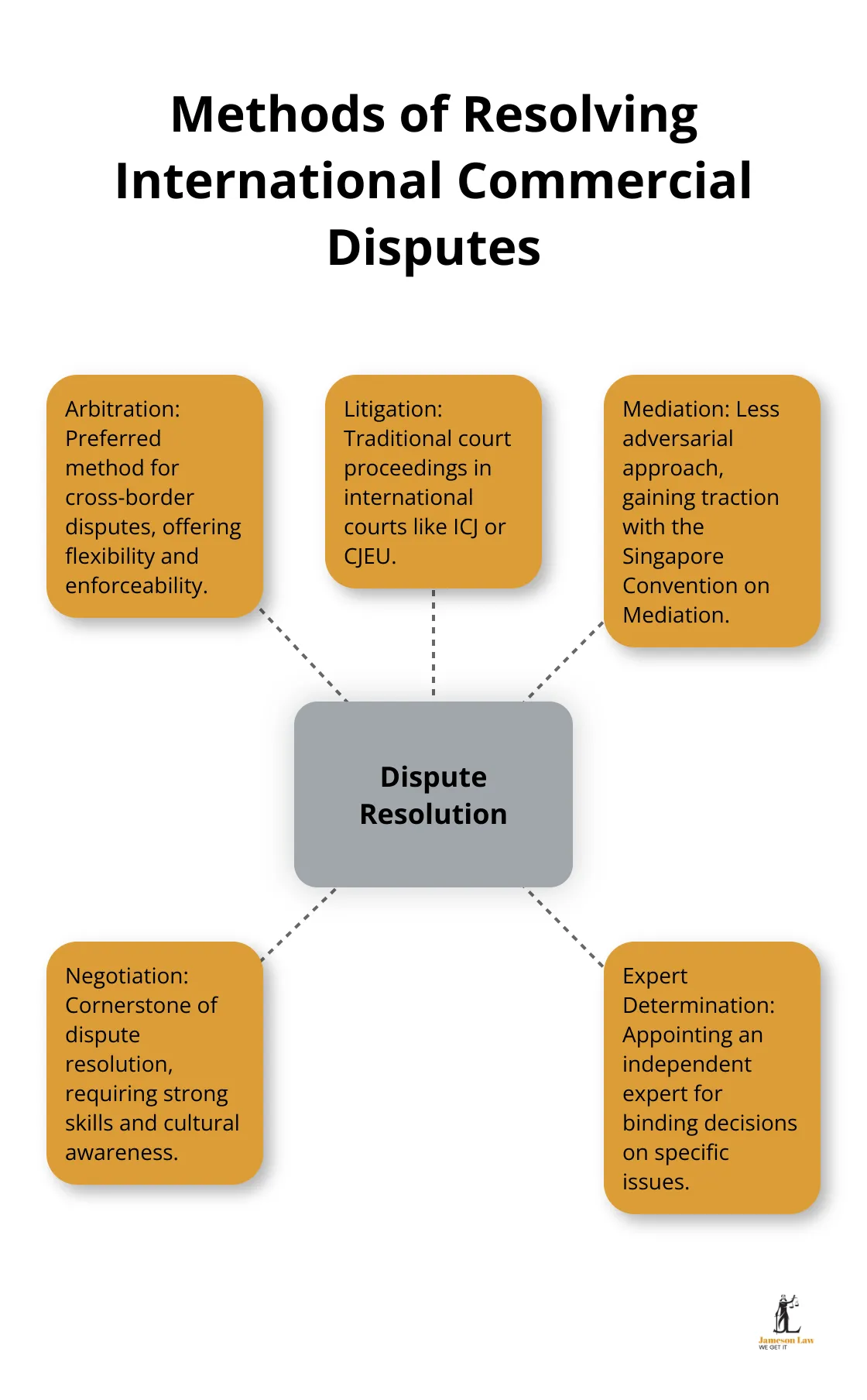International commercial law forms the Backbone of global trade and business relationships. As economies become increasingly interconnected, understanding these legal principles is vital for companies operating across borders.
At Jameson Law, we recognise the complexities that Australian businesses face when engaging in international commerce. This guide will break down the key aspects of international commercial law, equipping you with essential knowledge to navigate the global marketplace confidently.
Key Principles of International Commercial Law
The Scope of International Commercial Law
International commercial law governs business transactions across national borders. It combines elements of contract law, trade law, and international Conventions to create a framework for global commerce. This field covers a wide range of business activities, including the sale of goods, services, intellectual property rights, and Financial transactions. It addresses issues such as contract formation, performance, breach, and dispute resolution in an international context.
For Australian businesses engaging in cross-border trade, understanding these principles is essential. The United Nations Convention on Contracts for the International Sale of Goods (CISG) exemplifies international commercial law in action. Parties may freely appoint the CISG to be the rules governing their contract, which can be done by nominating a CISG state in their agreement.

Sources of International Commercial Law
International commercial law draws from various sources, including international treaties, domestic laws, and customary practices. The CISG, mentioned earlier, provides uniform rules for international sales Contracts.
Another important source is the UNIDROIT Principles of International Commercial Contracts. These principles set forth general rules for international commercial Contracts and shall be applied when the parties have agreed that their contract be governed by them.
In Australia, the International Arbitration Act 1974 incorporates the UNCITRAL Model Law, providing a framework for resolving international commercial disputes through arbitration. The 2020 ACICA Report collected information about the nature and extent of arbitration activity involving Australia and Australian parties.
The Role of International Organisations
International organisations shape and enforce international commercial law. The World Trade Organisation (WTO) sets rules for global trade and provides a forum for dispute resolution.
The International Chamber of Commerce (ICC) established the widely-used “Incoterms,” which help prevent disputes between parties in international trade by clearly defining responsibilities in shipping and delivery.
For Australian businesses, understanding these organisations and their rules is vital. The Department of Foreign Affairs and Trade (DFAT) reports that Australia actively participates in WTO negotiations and dispute settlement processes, influencing global trade rules to benefit Australian industries.
Freedom of Contract and Its Limitations
The principle of freedom of contract allows parties to negotiate terms, but it has limitations in international trade. The doctrine of restrictive immunity, for example, can affect Contracts involving foreign states or state-owned entities.
The CISG establishes the principle of good faith, which requires parties to act honestly and fairly in international commercial transactions. This principle can impact contract interpretation and performance.
Enforcement of Foreign Judgments
The enforcement of foreign judgments can present challenges in international commercial law. Australian courts may not always recognise foreign judgments that conflict with public policy. The Foreign Judgments Act 1991 provides a statutory framework for the recognition of foreign judgments in Australia, but its application is not universal.
Understanding these key principles of international commercial law equips Australian businesses to Navigate the complexities of global trade. As we move forward, we’ll explore important international commercial agreements that further shape the landscape of cross-border business transactions.
Key International Commercial Agreements
International commercial agreements form the Foundation of global trade, providing a framework for businesses to operate across borders. These agreements shape the rules of engagement, establish dispute resolution mechanisms, and protect investments. For Australian businesses venturing into international markets, understanding these agreements is essential.
The CISG: A Global Standard for Goods Sales
The United Nations Convention on Contracts for the International Sale of Goods (CISG) stands as a Cornerstone of international trade law. Adopted by 74 countries, the CISG provides a uniform set of rules for cross-border sales contracts. This agreement significantly reduces legal Uncertainties and transaction costs for Australian businesses engaged in international trade.
Under the CISG, Australian companies can streamline their contract negotiations with foreign partners. The convention automatically applies to Contracts between parties from different signatory countries unless explicitly excluded. This means that Australian businesses don’t need to negotiate every detail of their sales agreements from scratch, which saves time and resources.
However, it’s important to note that the CISG doesn’t cover all aspects of a sale. For instance, it doesn’t address the validity of the contract or the passing of Property. Australian businesses should seek legal advice to understand which areas of their international sales contracts the CISG covers and where additional clauses might be necessary.
WTO Agreements: Levelling the Playing Field
The World Trade Organisation (WTO) agreements Play a pivotal role in regulating international trade. These agreements cover a wide range of areas, from goods and services to intellectual Property rights. For Australian businesses, the WTO agreements provide a more predictable and fair trading environment.
One of the most significant WTO agreements for Australian companies is the General Agreement on Tariffs and Trade (GATT). This agreement has led to substantial reductions in tariffs, making it easier and more cost-effective for Australian businesses to export their goods globally.
Another important WTO agreement is the General Agreement on Trade in Services (GATS). This agreement is particularly relevant for Australia’s service-based economy, providing a framework for the liberalisation of trade in services. Australian service providers in sectors like finance, telecommunications, and professional services can leverage the GATS to access foreign markets more easily.
Bilateral Investment Treaties: Protecting Australian Investments Abroad
Bilateral Investment Treaties (BITs) are agreements between two countries that aim to promote and protect investments made by companies from one country in the territory of the other. These treaties are particularly important for Australian businesses looking to invest in emerging markets where legal protections might be less robust.
Australia has signed BITs with several countries. These agreements provide Australian investors with important protections, such as fair and equitable treatment, protection against expropriation, and the right to transfer returns freely.
One of the most valuable aspects of BITs for Australian businesses is the investor-state dispute settlement (ISDS) mechanism. This allows Australian companies to bring claims directly against foreign governments if they believe their rights under the treaty have been violated. While controversial, ISDS can provide a safeguard for Australian investments abroad.
However, it’s important to note that the landscape of BITs is changing. Australia’s foreign investment regime was amended by the Foreign Investment Reform (Protecting Australia’s National Security) Act, effective on 1 January 2021. Australian businesses should stay informed about these developments and seek expert legal advice when investing in countries where BIT protections may be evolving.
Understanding these key international commercial agreements is vital for Australian businesses operating in the global marketplace. They provide a framework for conducting international trade, offer protections for investments, and establish mechanisms for resolving disputes. As we move forward, we’ll explore how these agreements intersect with dispute resolution mechanisms in international commercial law, a critical aspect for businesses navigating cross-border conflicts.
Resolving International Commercial Disputes
The Power of International Commercial Arbitration
International commercial arbitration has become the preferred method for resolving cross-border business disputes. This process offers several advantages over traditional litigation, including flexibility, confidentiality, and enforceability of awards across borders.
For Australian businesses, the International Arbitration Act 1974 provides a robust framework for arbitration proceedings. This Act incorporates the UNCITRAL Model Law, ensuring that arbitration conducted in Australia meets international standards.
The 2020 ACICA Report revealed that just under 50% of international arbitrations involving Australia were seated in Australia. This trend highlights the growing confidence in Australia’s arbitration framework and expertise.

When drafting international contracts, Australian companies should consider including an arbitration clause. This clause should specify the seat of arbitration, the applicable rules, and the language of proceedings. The choice of arbitrators is critical; selecting experts with relevant industry knowledge can lead to more efficient and informed decisions.
Navigating International Courts
While arbitration is popular, litigation in international courts remains a viable option for dispute resolution. The International Court of Justice (ICJ) and various regional courts Play a significant role in resolving state-to-state disputes that may affect commercial interests.
For disputes within the European Union, the Court of Justice of the European Union (CJEU) is a key player. Australian businesses operating in the EU should be aware of the CJEU’s jurisdiction and its impact on trade regulations.
In cases involving intellectual Property rights, the World Intellectual Property Organisation (WIPO) Arbitration and Mediation Centre offers specialised dispute resolution services. This can be particularly valuable for Australian tech companies and creative industries expanding globally.
Embracing Alternative Dispute Resolution
Beyond arbitration and litigation, alternative dispute resolution (ADR) methods are gaining traction in international commercial law. Mediation, in particular, offers a less adversarial approach to conflict resolution.
The Singapore Convention on Mediation, which came into force in 2020, enhances the enforceability of mediated settlement agreements across borders. Although Australia has not yet signed this Convention, it’s a development worth watching for businesses engaged in international trade.
Negotiation remains a Cornerstone of dispute resolution. Australian companies should invest in developing strong negotiation skills among their legal and business teams. Cultural awareness is key; understanding the negotiation styles and business practices of foreign partners can prevent misunderstandings and facilitate amicable resolutions.
Expert determination is another ADR method gaining popularity (especially for technical disputes). This process involves appointing an independent expert to make a binding decision on specific issues. It can be particularly effective for resolving valuation disputes or technical disagreements in construction or IT contracts.

Australian businesses should regularly review their contracts and dispute resolution strategies to ensure they are well-prepared for any potential conflicts in the global marketplace. Companies should try to stay informed about the latest developments in international commercial dispute resolution (such as changes in arbitration rules or new Conventions) to maintain a competitive edge in the global business environment.
Final Thoughts
International commercial law shapes global business interactions. It provides a framework for companies to operate confidently in the global marketplace. Australian businesses must understand these legal principles to seize Opportunities and mitigate risks in an increasingly interconnected economy.
The ability to resolve disputes effectively through arbitration, litigation, or alternative methods can significantly impact an Australian company’s international success. Australia’s growing prominence in global dispute resolution highlights the importance of mastering these processes. Companies should stay informed about evolving trade regulations and seek expert legal advice to Navigate complex international commercial landscapes.
We at Jameson Law recognise the challenges Australian businesses face in international commerce. Our team of experienced lawyers can guide you through the complexities of international commercial law. We provide tailored legal support to protect your interests and facilitate your global business endeavours.













